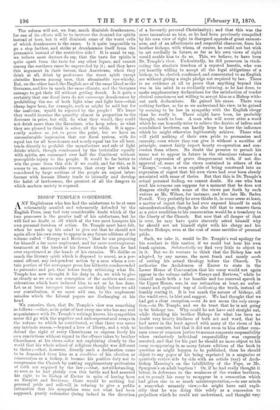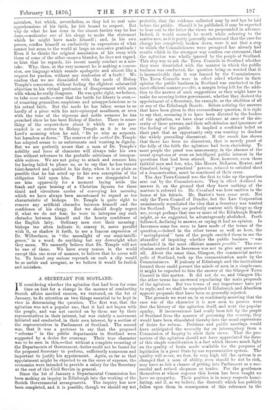BISHOP TEMPLE'S CONCESSION.
ANY Englishman who has had the misfortune to be at once vehemently assailed and vehemently defended by the English Press, may feel very considerable doubt which of the two processes is the greater half of his misfortune, but he will feel no doubt at all which of the two most hampers his own personal freedom of action. Dr. Temple must have felt, when he made up his mind to give out that he should not again allow his own essay to appear in any future editions of the volume called " Essays and Reviews," that he was preparing for himself a far more unpleasant, and far more contemptuous treatment at the hands of his former friends than he had ever experienced at the hands of his enemies. We dislike so much the literary spirit which is disposed to resent, as a per- sonal affront, any independent action by a man whom a cer- tain portion of the newspaper press has hitherto condescended to patronize and pet, that before freely criticizing what Dr. Temple has now thought it his duty to do, we wish to give as clearly as we can our conception of the motives and con- siderations which have induced him to act as he has done. Let us at least interpret those motives fairly before we add our contribution, if we must add one, to the unpleasant missiles which the Liberal papers are discharging at his head.
We conceive, then, that Dr. Temple's view was something as follows :—that, as in point of fact every one who has any real acquaintance with Dr. Temple's writings knows, his sympathies never did go with the negative and anti-supernatural essays in the volume to which he contributed, so that there was never any intrinsic reason,—beyond a love of liberty, and a wish to defend the right of every Churchman to express freely his own convictions without regard to the offence taken by brother Churchmen at his views,—fer not explaining clearly to the world that his whole school of religious thought was different to theirs ;—that, however, directly such a declaration came to be demanded from him as a condition of his election or consecration as a bishop, it became his positive duty not to compromise the Church by making supplementary professions of faith not required by the law ;—that, notwithstanding, so soon as ho had plainly won this battle and had asserted his right to be Bishop of Exeter in spite of having been an Essayist and Reviewer, there would be nothing but personal pride and self-will in refusing to give a public intimation that his sympathies were not what had been supposed, purely rationalist (being indeed in the direction of a fervently personal Christianity); and that this was the more incumbent on him, as he had been previously compelled- by his own view of right to disregard appeals of great earnest- ness, and of an affectionate and respectful character, from his brother bishops, with whom, of course, he could not but wish to act cordially in future, so far as his own views of right would enable him to do so. This, we believe, to have been Dr. Temple's view. Undoubtedly, he did persevere in vindi- cating the absolute freedom of a reputed heretic, who was yet heartily willing to accept all the legal obligations of a bishop, to be elected, confirmed, and consecrated to an English see without giving a single pledge not required by law. There is no evidence at all to prove that anything beyond this was in his mind in so stedfastly refusing, as he has done, to make supplementary declarations for the satisfaction of tender clerical consciences not willing to accept him as a Bishop with-. out such declarations. He gained his cause. There was nothing further, as far as we understand his view, to be gained. by seeming to be less in sympathy with the English clergy than he really is. There might have been, he probably thought, much to lose. A man who will never utter a word which he can honestly utter to relieve the doubts of infirm ancl scandalized brethren, can hardly hope to have the influence which he might otherwise legitimately achieve. Those who will yield nothing of their own pride to persuasion and entreaty, even where they can give it without a sacrifice of principle, cannot fairly expect hearty co-operation and con- cession from others. No doubt the promise to permit his name not to appear in future in the obnoxious volume is a virtual expression of grave disagreement with, if not dis- approval of, some of the views contained in others of the " Essays,"—nay, is even capable of being construed into an expression of regret that his own views had ever been closely associated with some of theirs. But that this is Dr. Temple's actual personal feeling, we cannot doubt. No one who has read his sermons can suppose for a moment that he does not disagree vitally with some of the views put forth by such writers as Mr. Wilson, for instance, and the late Mr. Baden Powell. Very probably he even thinks it, in some sense at least, a matter of regret that he had ever exposed himself to such misunderstandings, though he also felt that to remove them as a prior condition to his consecration would be a treachery to the liberty of the Church. But now that all danger of that is over, he may have quite sincerely asked himself why he should not set himself right with his clergy and his brother Bishops, even at the cost of some sacrifice of personal pride.
Such, we take it, would be Dr. Temple's real apology for his conduct in this matter, if we could but hear his own frank opinion. Substantially we find very little to object to in it. But we do venture to think that the Bishop has not adopted, by any means, the most frank and manly mode of setting his actual theology before the Church. To authorize the Archdeacon of Exeter to state in the Lower House of Convocation that his essay would not again appear in the volume called " Essays and Reviews," while he himself made both a too humble and too reserved speech in the Upper House, was, in our estimation at least, an unfor- tunate and equivocal way of indicating the truth, instead of frankly stating it. It is too much the nature of bishops, all the world over, to hint and suggest. We had thought that we had got a clear exception,—we do not mean the only excep- tion,—in Dr. Temple, and we do trust that be is not going to be bishopy too. Why could he not have said straight out, while thanking his brother Bishops for what has been no doubt very hearty kindness of both act and word, that he had never in the least agreed with many of the views of his brother essayists, but that it did not seem to him either com- mon sense or common justice to assume corporate responsibility when exclusively individual responsibility was expressly asserted, and that for his part he should no more object to his essay re-appearing in as many future editions of the book in question as might happen to be published, than he should object to any paper of his being reprinted in a magazine or quarterly review side by side with an article (say) of Arch- bishop Manning's on the infallibility of the Pope, or Mr. Spurgeon's on adult baptism ? Or, if he had really thought it better, in deference to the weakness of the weaker brethren, not to permit his essay to re-appear in a connection which had given rise to so much misinterpretation, to our minds a somewhat unmanly view,—he might have said expli- citly that he was doing this solely as a concession to prejudices which he could not understand, and thought very
mistaken, but which, nevertheless, as they led to real mis- apprehensions of his faith, he felt bound to respect. But why do what he has done in the almost furtive way he has done,—authorize one of his clergy to make the statement which he might have made himself ; and, in his own person, confine himself so exclusively to expressions of what cannot but seem to the world at large an excessive gratitude ? Even if he thinks the original association of his essay with those of some of the other essays a blunder, he does not regard, or hint that he regards, his recent manly conduct as a mis- take. Why, then, at the very moment he is making a conces- sion, use language which sounds apologetic and almost like a request for pardon, without any confession of a fault ? We confess that we are dissatisfied with the mode of Bishop Temple's concession, without feeling the slightest substantial objection to his virtual profession of disagreement with men with whom he really disagrees. He was quite right, we believe, to take some mode,—now that the battle for liberty is over,— of removing groundless suspicions and misapprehensions as to his actual faith. But the mode he has taken seems to us hardly of a piece with his ante-episcopal manliness, or even with the tone of the vigorous and noble sermons he has preached since he has been Bishop of Exeter. There is some- thing of the serpent-dove about it which we are per- suaded is as untrue to Bishop Temple as it is to our Lord's meaning when he said, " Be ye wise as serpents, but harmless as doves." The reserve of the method Dr. Temple has adopted seems to us unfortunate and wanting in dignity. But we are perfectly aware that a man of Dr. Temple's nobility and force of character will always take his own line without reference to the probable criticisms of irrespon- sible writers. We are not going to attack and censure him for having failed to please us, or to say that he has turned faint-hearted and quailed in his duty, when it is as plain as possible that he has acted up to his own conception of the obligation laid upon him. But we are disappointed to see him apparently for a moment laying aside the frank and open bearing of a Christian layman for those timid and circuitous modes of conveying his meaning which we have always been accustomed to regard as too characteristic of bishops. Dr. Temple is quite right to remove any artificial obstacles between himself and the confidence of his clergy. But we should deeply regret if, what we do not fear, he were to interpose any such obstacles between himself and the hearty confidence of the English laity. Ordinary men state their meaning ; bishops too often indicate it, convey it, move parallel with it, or shadow it forth, to use a famous expression of Dr. Wilberforce, in "the moonlight of our semi-intelli- gence," in a word, do anything but say downright what they mean. We earnestly believe that Dr. Temple will not be one of these. We have every reason in the world except this one error of manner, to believe that he never will be. To found any serious reproach on such a slip would be as unfair and arrogant, as we believe it would be foolish and mistaken.



































 Previous page
Previous page